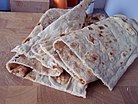|
'''Sheermal''' or '''Shirmal''' (]-]: {{nq|شیرمال}}, {{lang-hi|शीरमल}}), is a ]-flavored traditional ] from ].<ref>{{cite web|url=https://www.foodaholic.biz/sheermal-persian-sweet-bread/|title=Sheermal, Persian Sweet Bread|publisher=|accessdate=5 October 2014}}</ref> The word sheermal is derived from the Persian words شیر (] sheer) meaning milk, and مالیدن (] malidan) meaning to rub. In a literal translation, sheermal means milk rubbed. After being introduced to North India by the Persianate ] emperors. It became a delicacy of ],]and ].<.<ref>{{cite web|url=http://www.hindu.com/thehindu/mp/2003/05/29/stories/2003052900410300.htm|title=The Hindu : A nawabi affair|publisher=|accessdate=5 October 2014}}</ref> It is also part of the ]<ref>{{cite web|url=http://www.hindu.com/mp/2007/07/21/stories/2007072152370400.htm|title=A slice of the Awadh exotica|work=The Hindu|accessdate=5 October 2014}}</ref> and is enjoyed in Old Bhopal. |
|
'''Sheermal''' or '''Shirmal''' (]-]: {{nq|شیرمال}}, {{lang-hi|शीरमल}}), is a ]-flavored traditional ] from ].<ref>{{cite web|url=https://www.foodaholic.biz/sheermal-persian-sweet-bread/|title=Sheermal, Persian Sweet Bread|publisher=|accessdate=5 October 2014}}</ref> The word sheermal is derived from the Persian words شیر (] sheer) meaning milk, and مالیدن (] malidan) meaning to rub. In a literal translation, sheermal means milk rubbed. After being introduced to North India by the Persianate ] emperors. It became a delicacy of ],] and ].<ref>{{cite web|url=http://www.hindu.com/thehindu/mp/2003/05/29/stories/2003052900410300.htm|title=The Hindu : A nawabi affair|publisher=|accessdate=5 October 2014}}</ref> It is also part of the ]<ref>{{cite web|url=http://www.hindu.com/mp/2007/07/21/stories/2007072152370400.htm|title=A slice of the Awadh exotica|work=The Hindu|accessdate=5 October 2014}}</ref> and is enjoyed in Old Bhopal. |
 Sheermal served in Iran.
Sheermal served in Iran.